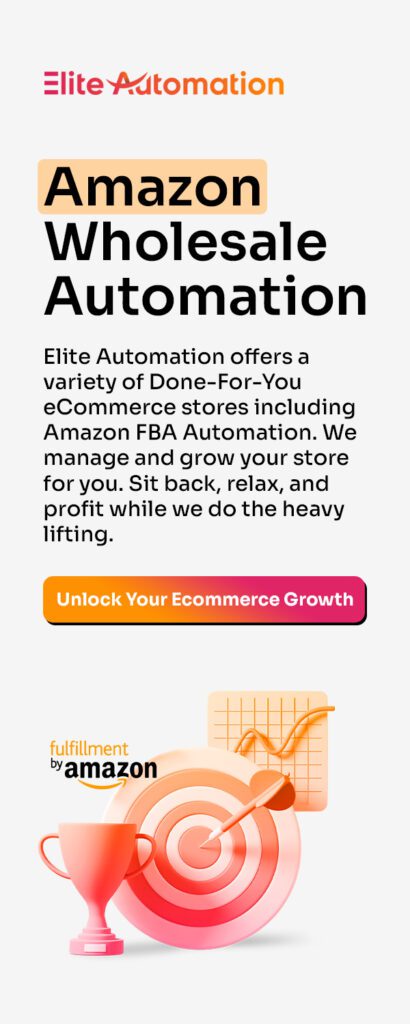In 2021, global retail ecommerce sales rose to 4.9 trillion US dollars. Not surprisingly, this number is predicted to grow by 50% over the next four years, hitting around $7.4 trillion by 2025.
Although online marketplaces like Amazon, eBay, and Etsy offer an incredible opportunity to sell products, they have their set of limitations. For this reason alone, having an online website in today’s fast-paced world is a must.
A website not only opens the doorway of selling products, but you also have the freedom to share valuable content, earn credibility, build brand image, and attract a passionate audience.
Find out how else a website can benefit your business below.

8 Reasons Sellers Should Have Their Own Ecommerce Website
Selling products on e-commerce marketplaces has its pros. But at the end of the day, you might find yourself stuck between unwanted rules and regulations, which may limit how you want to implement your marketing strategies.
However, that alone isn’t a valid reason to build your own ecommerce website. If you want to thrive in the ever-evolving ecommerce world, earn loyal customers, and boost your brand’s credibility, you must consider creating one.
Data reveals that 75% of consumers admit making judgements of a brand’s credibility based on their website.
We’ll unveil the top 8 reasons you should have your website.
- Owning Your Brand Means Owning a Customer Base
Not just selling on third-party marketplaces means you are in control of your brand. When you build a company website, your customers purchase from you, not the ecommerce channel – a proud moment indeed.
This, in turn, helps you boost brand loyalty because you own the sale – and the customer.
Nonetheless, note that if you sell on platforms like eBay or Amazon, you still have a chance to brand your items as long as it doesn’t conflict with Terms and Conditions, here’s how.
- Include your website logo and URL whenever possible.
- Brand your packaging and boxes to shift customers to your website.
- Connect with consumers as a company, not a person.
- Promote Loyalty and Brand Recognition
Repetitive sales are one of the main reasons behind the success of an online retail business. Why? Because selling your products to an existing customer is easier and 20% more cost-effective than doing more business.
When you own a website, you have a chance to increase customer touchpoints and repeat sales, enhancing customer satisfaction. Here’s what you can do with a website:
- Move customers to your social media handles.
- Let them sign up via email.
- Offer them value via shared content like blogs, videos, and infographics.
- Use deals and coupons to attract existing customers

3. Give Customers Omni-channel Experience
Warren Buffet quotes, “Don’t put all your eggs in one basket.” If you invest your entire company on a single platform, you can lose it entirely at any time. For instance, Walmart sometimes suspends running online accounts without prior warning.
Yes, those accounts often get reinstated, however the brand loses customers and money when offline.
Therefore, online retailers should implement the omni-channel model. This way, you won’t place all your eggs in one basket. The division of risk will protect your business, and you’ll generate revenue even if something goes wrong on one platform.
4. Decrease Cost Per Sale With Your Own Store
Not surprisingly, you have to pay a fee to the platform you use to sell your products. The typical “referral fee” on sales is 15% like on marketplaces such as Amazon and Walmart. While building a website may not be inexpensive, you might reduce your cost per sale as soon as sales increase.
As such, when more customers buy from your website, you’ll save paying a percentage to the marketplaces and potentially decrease your overall cost per sale.
5. More Marketing Opportunities
Having your website allows you to do promotional marketing, which is frowned upon on platforms like Amazon or eBay. When you sell products on third-party websites, you must comply with their policies. This means no requesting positive feedback, no contacting via the customer’s phone number which was captured on Amazon’s checkout page, etc. But things change if a customer purchases from your own e-commerce website.
With your website, the chance of remarketing your brand increases, and so does the revenue.
For instance, if you sell coffee mugs, you can partner with a brand selling coffee by offering discounts to their customers on their first purchase from your brand.
This would give value to your partner’s brand, your company, and your customers. You can also capture and save customer’s data such as first and last name, email address, and phone number to use for retargeting or remarketing purposes in the future.
6. Better Search Marketing
With a website, you can improve sales through search marketing which is less likely through an online marketplace unless you are always running PPC ads.
For instance, SEM and SEO drive traffic to your store. Owning a website allows you to optimize your website or storefront for search in a search engine instead of search within a marketplace. A marketplace with millions of listings can only optimize a few listings for search, which is a downside.
Further, you can share blogs, videos, and images – on your website – to strengthen customer relationships and increase revenue. Make sure to conduct market research and keyword research before creating content for your website. You want to rank as high on search as possible for your desired store niche and keywords.

7. Global Reach
Online marketplaces have restrictions and limitations, and once you sell your items there, you have no option but to abide by their terms of service.
With your own website, you do not have any such restrictions. You can sell your products wherever and however you want. You choose your marketing practices, payment methods for checkout, and overall look and feel of your store.
You can actively engage with your customers that other platforms do not allow. Besides, it enables you to explore more logistic options and offer a seamless shopping experience to customers.
On top of that, merchant processing options are in your hands. Unlike marketplaces that offer limited options, you can choose the features that best suit you and your global customers.
8. Private Labeling
Private labeling is another bonus you have as a brand with a website. Branding your products will earn customer trust and lead to repeat sales.
Besides, you’ll have more chances to collect consumer data, allowing you to design better products and improve services for your customers.
Final Words
Although ecommerce has been rapidly growing even prior to the pandemic, the global crisis accelerated it to the point that today businesses must adapt and move online.
With more brands online, consumer trends are shifting and becoming more demanding. Therefore, selling products on both marketplaces and your own website is beneficial.
You need to build your brand’s website to boost credibility, gain consumer trust, and earn recognition as a true brand in the expanding digital world.

